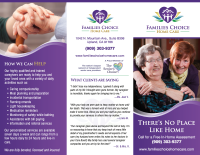The older population in the U.S. rose by 34.2% within the past decade. From the estimations, one in five Americans will be 65 years and above by 2030. These figures are an indication that assisted living will continue to rise in demand over the next few years.
If your parents are in this category, your primary options for assisted living are either in a nursing facility or home care. While taking seniors to a nursing home has its advantages, home care takes the trophy. Your loved one will be around familiar faces, and the option is cost-effective.
Are you considering home care for your elderly loved one? Here’s a guide on everything you need to know about home health care and why it is an ideal option.
What Is Home Care?
Home care refers to the supportive care that an individual receives from their home. This setting allows patients to receive health services at their home’s comfort. Home care also referred to as home health care is ideal for people who are recovering from injuries, illnesses, and those with chronic conditions like cancer and diabetes.
Most seniors fall into the category of people who requires home care. Persons receiving home care often have a variety of needs, especially if they have advanced in age. Most of these patients need assistance in ambulation, taking medications, and carrying out some of the typical daily activities.
If your parent is above 65 years, you might need to check out for signs to know if they qualify for assisted living. Instead of checking them to a nursing facility, have them receive the care at home. Home health care professionals will ensure that your loved one ages gracefully without feeling like they have been abandoned in a nursing institution.
Types of Home Care
Home care is categorized into nursing care, non-medical personal care, and standard home health care. You can have either of these services or a combination depending on the needs of the senior person.
Nursing Care
Home nursing care is for older persons who require medical attention for a disability or chronic illness. Licensed practical nurses or registered nurses often provide this type of care. Their primary role is to provide specialized medical care that mostly includes administering shots, dressing wounds, giving medication, and monitoring the health of the senior.
The nurses perform a range of other services that help the patient to be well-groomed. They further train the family members on how to take care of the seniors. While in-home nursing care isn’t always necessary, it can prove essential for older people who are battling chronic health issues.
Non-Medical Home Care
Your elderly folks might not be having any underlying chronic conditions, but as they age, they will need further assistance to live a healthy life. Non-medical home care professionals help with some basic tasks such as cleaning and cooking. They don’t have medical skills, but they have been trained to assist patients struggling due to age, disability, or chronic illness.
If you’re not always at home, you might be wondering how to help your elderly parent combat loneliness. The non-medical home care professionals are an ideal solution as their primary roles revolve around companionship and personal care. They usually help with daily activities such as household tasks, meal preparation, bathing, dressing, and a host of other activities.
Home Health Care
Home health care is almost similar to nursing care. However, home health care is short-term. It helps patients to recover from injury, illness, or preventive care.
The home health care professionals can either be nurses, occupational therapists, physical therapists, physicians, speech pathologists, and social workers. The main aim of this care is to help patients live independently. Doctors prescribe home health care, depending on the situation of the patient.
Benefits of Home Care
Home care is an ideal choice for families that want an affordable and safe solution for their seniors. Here are some of the benefits that you stand to get with home care:
Individualized Support
With home care, chances of neglect are incomparable to a nursing facility where professionals are taking care of several seniors. Home care provides one-on-one support, which is often tailored to meet the different needs of an older person. The support is unique, and your loved one won’t feel alone.
Better Health Outcomes
Home care gives an ideal environment for better recovery. The complications are fewer with home care. The combination of intentional social and physical care at home enables patients to have an easier recovery as compared to patients admitted to the hospital.
Access to Optimal Services
Did you know that more than 15.7% of seniors are subject to elder abuse every year? The statistic is not even definite, considering that only one in 24 cases are reported. Elder abuse is prevalent in nursing homes and other long-term care facilities.
Having your elderly parents at home is one of the ways to ensure they are receiving optimal care, and they aren’t being mistreated. Other than the home care professionals, there are usually other people at home, which reduces the likelihood of abuse.
Home Care Is Affordable
When compared to hospital care and nursing facility, home care is an affordable alternative. With the facilities, the cost will go higher as you have to factor in the accommodation, food, and other services. With home care, you will only need to pay the home care provider based on the visits.
If the older person has people around, nursing care can be reduced to a few hours a day. The cost-effectiveness is a factor to consider when looking for eldercare.
Home Care for Seniors Is a Considerable Alternative to Nursing Facilities
Most families want the best for their aging parents. Given the probable health deterioration, assisted living among the seniors is something families need to consider with time. Fortunately, you don’t have to feel limited to nursing facilities.
You can opt for home care, which is equally sufficient. The type of home care to choose depends on the needs of your loved one. When you get the right home care professionals, the benefits will be imminent.
At Family Choice Home Care, we understand the importance of having your loved ones aging at the comfort of their home. Contact us today for personalized, one-on-one, and compassionate home care.






